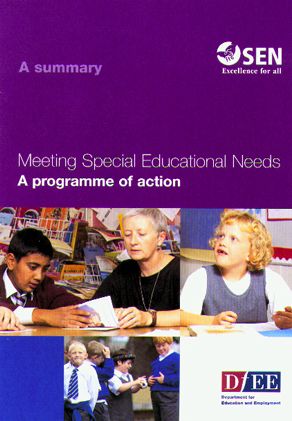National Policies on Inclusion in England: how well are we doing?
Tony Booth
(Reduced version from EENET Newsletter)
My view is that inclusion in education involves increasing access to, participation within, and reducing exclusion from, local centres of learning for all learners and their families. So what is the balance between inclusionary and exclusionary pressures in current English educational policies?
A succession of governments have decreased local democratic control over education and increased competition between schools. Parents are encouraged to select schools according to league tables of examination results. Such policies undermine the relationship between a school and its immediate neighbourhood. They discourage schools from welcoming learners who experience difficulties and may be perceived to undermine their league table position. In many cities this has worsened ethnic segregation. Such changes have occured when the gap in wealth between the richest and poorest communities has considerably widened.
Yet, such developments coincide with a more open support for inclusion, narrowly defined. The government’s ‘Programme of Action’ for ‘Meeting Special Educational Needs’ describes ‘inclusion’ as the ‘keystone’ of the government’s strategy. It encourages ‘all schools to develop an inclusive ethos, …by involving all staff in training activities to promote a greater understanding of inclusion’. The report argues that ‘an increasing number of schools are showing that an inclusive approach can reinforce a commitment to higher standards of achievement for all children’. It suggests that schools less able to respond to learners, who experience difficulties, must learn from others: ‘we will work and provide funding…to ensure that the high quality provision for children with complex needs, which some mainstream schools are already making, is available much more widely’. Yet there is also a determined defence of the future of special schools which ‘should continue to play a vital role as part of an inclusive local educational system’.

Every local administration must demonstrate annually, in its Education Development Plan, how it is increasing ‘inclusion’ and has to have a specific mainstream behaviour support plan. There is also a plan to tighten up the Disability Discrimination Act which could promote access to the mainstream both for an increasing number of disabled learners and for disabled staff.
Documents related to ‘inclusion’ have emerged from a number of Government departments and there is a lack of co-ordination between them. Issues of behaviour are separated from learning, and exclusion for disciplinary reasons from exclusion in relation to disability. There is a continued emphasis on educational difficulties as due to the ‘special educational needs’ of learners and, in itself, this can be a barrier to inclusion. It discourages the reflection on changes in organisation, curricula and teaching approaches which might contribute most to increasing the quality and extent of participation of learners within local centres of learning.
However, some suggestions represent significant developments in government thinking. A document on ‘social inclusion’ highlights the barriers to learning and participation experienced by learners in ‘families under stress’, children looked after by the state, ethnic minority learners, travellers, learners who have responsibility for the care of other family members and those moving between institutions. Such a broad examination of groups vulnerable to exclusion might eventually help to link all learners who experience barriers to learning, within a common policy framework.
Read a longer version of this article.
For more details contact: A.J.Booth . 277 Hills Road . Cambridge . CB2 2RP . UK. Tel: 01223 244696. Email: A.J.Booth@open.ac.uk
